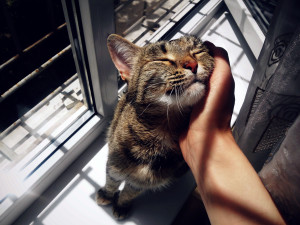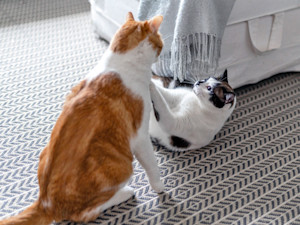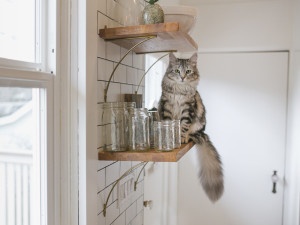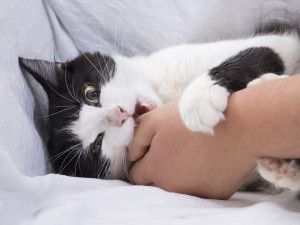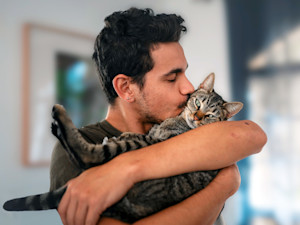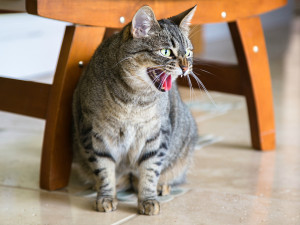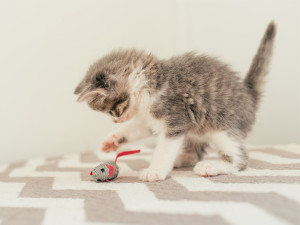
Share Article
In This Article:
Why Is My Cat Biting Me? Specific Cat Biting Scenarios How to Stop My Cat From Biting Me Frequently Asked Questions
Cats may seem to randomly attack and bite their guardians, but this behavior is often rooted in underlying causes, like playfulness, overstimulation, fear, communication, or even medical issues. Understanding the triggers for these seemingly unprovoked attacks is crucial for addressing the behavior effectively. Once you’re able to pinpoint what’s making your cat act aggressively, it’s much easier to curb the behavior (especially if it’s your behavior that is causing the aggression, which is sometimes the case).
And remember — this is an important topic because you’ve essentially got a semi-wild predatory beastie running loose in your house. Cats are nearly perfect killing machines, and they have the equipment to prove it. So, biting and scratching humans can be a very serious problem and have significant consequences to both the human and cat. We don’t want more people sent to the hospital emergency room, and we don’t want more cats surrendered to shelters due to aggression, so let’s figure this stuff out.
Why is my cat biting me?
There are numerous reasonsopens in new tab why your cat might be biting you, including play aggression, petting-induced aggression, fear or anxiety, redirected aggression, or even pain. Once you understand why your cat is biting you, it’s easier to figure out ways to get the aggression to stop.

Playfulness
Playful aggression may happen if your cat or kitten wasn’t raised with siblings, so they didn’t learn about “bite inhibition” (or what causes ouchies). Play aggression may also occur in cats who aren’t getting their play or hunting needs met. With these cats, they’ll sometimes stalk and ambush you, targeting feet, ankles, arms, and hands — the things on our bodies that move the most.
You’ll likely not hear any growling or hissing, and your cat may grab you and attempt to “bunny kick” you with their back feet once they’ve got you in their grasp. Awww — cute, but painful!
Overstimulation
Overstimulation is sometimes known as petting-induced aggression. This occurs when a cat would like the petting to end but the human is either unaware of this or chooses to continue petting the cat. Usually, the cat will give some subtle signals to indicate that they are done with petting, like starting to flick the tail, directing their ears backward, or even dilating their pupils. When these signals are observed, it’s best to stop touching your cat.
Fear or anxiety
Cats will also become aggressive when they are fearful or anxious. There are a variety of ways that cats can react to fear or anxiety (i.e., fight, flight, freeze, or fawn), but fight is often a choice made out of the need to defend (and sometimes the best defense is a good offense, right?).
A fearful cat will often have their ears flattened to the sides, be crouched down, wrap their tail tightly around their body, have dilated pupils, and whiskers pressed flat against their face. You’re also more likely to hear hissing and growling from a cat who is afraid of something. A fearful cat can be a dangerous cat though, so it’s best to keep your distance from a fearful kitty.
Redirected aggression
Redirected aggression occurs when a cat is agitated by something they can’t access (like another cat they’re watching outside from a window) but then redirects that pent-up aggression onto another nearby cat, human, or family pet.
A cat can also redirect their aggression to a human after having a conflict with another cat in the household. Redirected aggression can be tricky, since we often don’t see or even know the source of the original agitation, so this type of aggression can seem like it comes out of nowhere.
Pain
Any medical condition that causes pain can be a reason why a cat bitesopens in new tab, scratches, or hisses. If you suspect your cat is in pain, try to avoid touching them where they seem to have a reaction and work with your veterinarian to figure out what’s happening with your cat’s health and how pain can be appropriately managed.
Specific cat biting scenarios
It may be hard to picture your darling angel kitty biting you, but if you’ve been on the receiving end of a bite coming from nowhere, it’s probably a scene you won’t forget anytime soon. But let’s take a look at a few common scenarios in which cat bites can occur, and why they happen:
Why is my cat biting me when I pet her?
It’s evening and you’ve had a long day and you just want to settle down on the couch and watch some 90 Day Fiance. Your fluff-muffin has also had a long day so they settle down on your lap, and you begin to pet them absentmindedly…when a few minutes later, chomp!
You neglected to notice that their tail started flicking and their ears turned back after several minutes of petting, so you continued. Petting-induced aggression strikes again! Alternatively, this scenario might have occurred due to pain…perhaps there’s an owie your cat has that you didn’t know about. If this is the case, you’ll want to schedule your kitty’s next vet visit soon.
Why is my cat biting me all of a sudden?
You’ve just come home from work when out of nowhere your cat zooms around a corner and tackles your foot, then races off. What tha…?!? Your cat might be telling you that he needs more playtime, especially in the early evening when cats are waking up and getting ready to hunt. It’s time to start implementing daily play sessions with a long wand toy to meet their predatory needs!
Why is my cat licking me and biting me?
When licking is accompanied by biting, that’s usually a sign of affection (as long as those nibbles remain light and friendly, love-bite style). Your cat may taste something yummy on you (like salt), and has decided you need a cleaning. But as long as your cat isn’t trying to actually eat you, you should be in fine shape.
Why is my cat aggressively biting me?
You hear a loud BANG outside as the garbage truck drops a trash container in the street. You proceed into the bedroom where your cat is at the window, all puffed up (“piloerect”), with eyes dilated and ears to the side. They’re also emitting a low growl — that cat is afraid! To avoid redirected aggression from this agitated cat, slowly exit the room and give them several minutes to calm down.
How to stop my cat from biting me
Once you know the reason behind your cat’s bite, you’re prepared to get the biting to stop. But there are some additional things to keep in mind:
Proper reaction to sudden attacks
Do not yell at, hit, use a squirt bottle, or inflict any other form of punishment on your cat; if your cat is afraid, it will just increase fear, and if your cat is playing or trying to tell you to stop petting, punishment could transform those types of aggression into fear-based aggression, which is much more difficult to manage and resolve. Instead, let your hand (or bitten body part) go limp, say OUCH, and stay still, only moving to gently extract yourself. After that, get up and walk away; the message is, “If you bite like that, you don’t get to interact with me at all”.
Positive reinforcement training
If your cat is biting you to get your attention because they want something (food, petting, play, etc.), use positive reinforcement when your cat asks for those things in an appropriate way (like sitting calmly, rubbing against your legs, or meowing…anything but biting). Positive reinforcement can include petting, treats, playtime — anything your cat likes!
Prevention strategies
Knowing how to handle your cat appropriatelyopens in new tab can prevent petting-induced and other forms of aggression. Give your cat choice and control over when/where they’re touched, pay attention to their body language, and limit touch to areas you know your cat likes being touched. Redirecting a playful cat to a long wand toy can also be an effective way to curb play aggression.
When to seek professional help
If you think that your cat is in pain or has a condition that might be causing pain and sensitivity during handling, it’s time to talk with your veterinarian. But if you are stumped as to why your cat is biting you, there are numerous cat behavior consultants who can help provide insight and resolution to your situation. Help is out there if you need it!
FAQs (People also ask)
Is a cat bite dangerous?
Cat bites can be very hazardous because when cats bite, those long pointy canine teeth inject bacteria from the cat’s mouth deep into the puncture wound they create. If you have a deep puncture wound, wash the wound immediately and see a doctor to prevent infection.
Do cats get jealous?
It’s not really possible to know if cats get jealous per se, but we can observe their behavior to see if there are signs that indicate jealousy. These signs can include acting possessive, aggression, seeking extra attention, and other behaviors.
References:

Marci Koski
Marci Koski fell in love with cats as a toddler and never looked back, even leaving a career as an endangered species biologist for the U.S. Fish and Wildlife Service to start her own cat behavior consulting service, Feline Behavior Solutions in 2014. Since then, Marci has been helping people resolve their cat behavior issues by teaching people “how to cat” — namely, how to give their cat the resources and environments they need to thrive with their human companions.
Marci has a PhD in Fishery and Wildlife Biology, and earned her specialized and advanced Feline Training and Behavior certifications through the Animal Behavior Institute.
Related articles
![cat biting person's hand]()
Why Does My Cat Bite Me?
Don’t live in fear of your feline overlord.
![Two cats in a living room that appear to be arguing.]()
Me-OW! Should I Break Up a Cat Fight?
Between actual cats, people.
![Man holding his cat.]()
Your Cat’s Anxiety—Explained
Because they’re probably not going to tell you why they just scratched the heck out of the couch.
![cat hissing under chair]()
Cat Hissing: Fair Warning or Fighting Words?
Your cat’s hissy fit could mean Don’t test me or Let’s do this. We wouldn’t call their bluff.
![A kitten playing with a mouse cat toy.]()
How to Keep Your Kitten From Making You the Toy at Playtime
Your cat deserves to play. You deserve to walk away unscathed.


